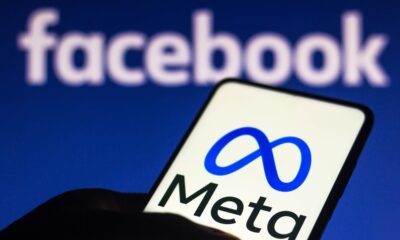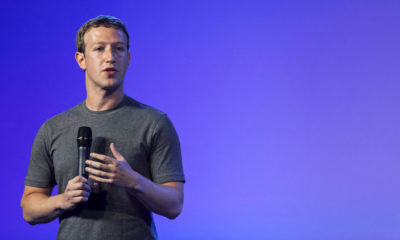Mark Zuckerberg and his wife pledged to give away virtually all of their $46 billion in Facebook Inc. shares, setting a new philanthropic benchmark by committing their massive fortune to charitable causes while still in their early 30s.
Facebook’s chief executive officer and his wife, Priscilla Chan, unveiled the plan in an open letter to their newborn daughter, Max (short for Maxima), in a Facebook post on Tuesday, promising to donate 99 percent of their stock in the social-networking company “during our lives.”
The pledge puts Zuckerberg in the same league with other billionaires who are giving away the bulk of their wealth, including Warren Buffett and Bill Gates. The key difference is that Zuckerberg is starting at an earlier age, 31. The Bill & Melinda Gates Foundation was created in 2000, the year the Microsoft Corp. co-founder turned 45.
Zuckerberg doesn’t plan to contribute more than $1 billion a year for at least the next three years, Facebook said in a separate filing, meaning the CEO will maintain voting control of the Menlo Park, California-based company for the foreseeable future.
‘Too Important’
Zuckerberg outlined his philanthropic goals, which will focus on “advancing human potential and promoting equality,” in the letter to his daughter, who was born early last week. Zuckerberg will make long-term investments in areas such as health and education, while working to decrease inequality and building technology to bring about change.
“Our society has an obligation to invest now to improve the lives of all those coming into this world, not just those already here,” Zuckerberg and Chan wrote. “But right now, we don’t always collectively direct our resources at the biggest opportunities and problems your generation will face.”
He added that he will remain Facebook’s CEO for “many, many years to come, but these issues are too important to wait until you or we are older to begin this work.”
Different Audience
While Zuckerberg pegged the donation amount on the current value of his Facebook stock, the value of the gift could also grow. Shares of Facebook have climbed more than 180 percent since their market debut in 2012, and 90 percent of analysts who cover the company have a buy rating on the stock, meaning they expect it to go up. At the same time, the figure could be lower if investors determine in the future that Facebook’s stock is worth less.
It’s unusual for an executive to undertake such a broad philanthropic effort at so young an age. Buffett, the chairman and CEO of Berkshire Hathaway Inc. who has committed almost all of his fortune to charity, has singled out Zuckerberg as someone who can set an example for a new generation of philanthropists.
“He has an audience that’s just totally different than what I would have,” Buffett, 85, said last year at a conference in Las Vegas. The Facebook co-founder previously signed the Giving Pledge, established by Buffett and Bill and Melinda Gates, in which billionaires agree to donate the majority of their fortunes to charity.
Buffett, whose current net worth is $64.2 billion, according to the Bloomberg Billionaires Index, decided to commit most of his Berkshire stock to the Bill & Melinda Gates Foundation when he was 75, after his the death of his first wife in 2004.
Before devoting himself to philanthropy, Gates chose to focus on his company rather than charitable efforts, much to the dismay of his own mother and local Seattle business and philanthropic leaders, Tom Alberg, co-founder of Seattle-based Madrona Venture Group, said in a recent interview. It was after the death of Mary Gates in the mid-90s that Gates began his first significant foray into charitable giving.
The Gates’s charitable foundation, now worth $41.3 billion, has given away more than $34 billion. Gates started the organization in 2000, subsuming two earlier entities: the William H. Gates Foundation and the Gates Learning Foundation. Both of the men have mentored Zuckerberg in his philanthropy efforts.
“On behalf of future generations, I thank them,” Buffett said of Zuckerberg and Chan in a statement.
There’s also one more thing in common with the philanthropic endeavors of Buffett, Gates and Zuckerberg: they reduce their tax bills, as the contributions are tax-deductible.
Track Record
Zuckerberg isn’t new to philanthropy; he’s given to several education and health-related causes in the past few years. He and his wife recently started a school in one of Silicon Valley’s disadvantaged neighborhoods and a trauma center in San Francisco General Hospital, where Chan has worked as a pediatrician. The couple this week also started a coalition with Gates to invest in sustainable energy solutions. The new Chan Zuckerberg Initiative will be a limited liability company controlled by Mark and Priscilla, the couple said.
Today, 99 percent of Zuckerberg’s Facebook holdings have a value of $45 billion. If it was all to be gifted at once that would be enough to create the largest U.S. foundation, according to data compiled by Foundation Center. The pledge also situates Zuckerberg and Chan in a century-long tradition of American philanthropists that stretches back to industrialists Andrew Carnegie and John Rockefeller, whose foundations still rank among the biggest in the country.
“I absolutely think this propels Zuckerberg and his wife into that sphere,” said Berit Ashla, vice president at Rockefeller Philanthropy Advisors. “They clearly are not going to be siloed grantmakers. I anticipate they will be quite interdisciplinary in terms of how they approach the work.”
Bloomberg


 Billionaire Watch3 weeks ago
Billionaire Watch3 weeks ago


 Startups4 weeks ago
Startups4 weeks ago


 News4 weeks ago
News4 weeks ago


 News4 weeks ago
News4 weeks ago


 Bitcoin4 weeks ago
Bitcoin4 weeks ago
 Naira4 weeks ago
Naira4 weeks ago
 Forex3 weeks ago
Forex3 weeks ago
 Treasury Bills4 weeks ago
Treasury Bills4 weeks ago












